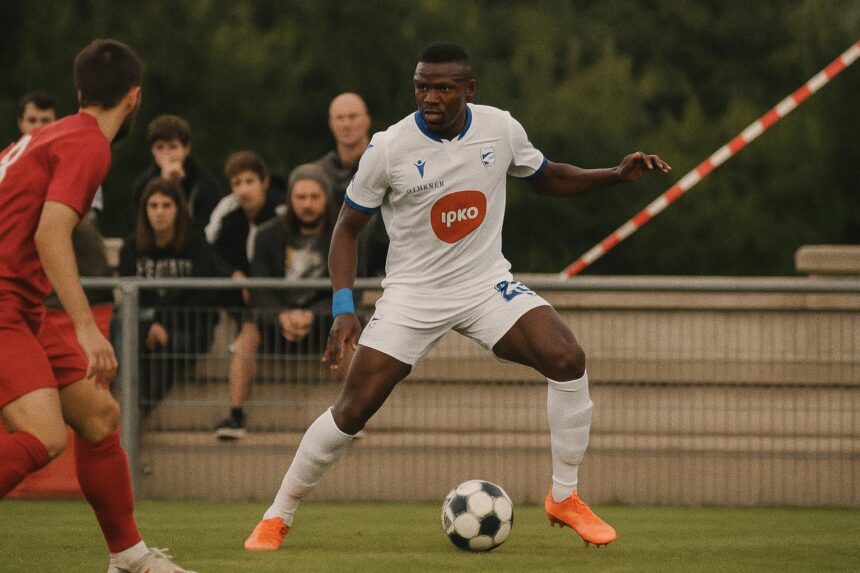An away success consolidating momentum
The narrow 1–0 advantage secured in the first leg in Pristina had left FC Drita with the delicate task of confirming their passage on foreign soil. In the return fixture at Luxembourg’s Stade Municipal de la Ville de Differdange, the Kosovar champions demonstrated both maturity and opportunism, prevailing 3–2 in a match marked by fluctuating rhythms and a late surge from the hosts. According to the official UEFA match log, Drita’s aggregate 4–2 scoreline guarantees their continuity in the competition and extends Kosovo’s modest yet increasingly confident European presence (UEFA match centre).
For observers of Central African football, the evening’s significance lay not solely in the result but in the ninety-minute contribution of Raddy Ovouka. The Brazzaville-born international, deployed at left-back, maintained positional discipline while supplying the occasional forward thrust that has become his signature since his emergence with CSMD Diables Noirs and later Accra Hearts of Oak. His participation from first whistle to last offered tangible proof of his physical readiness after a spring hampered by minor muscular concerns.
Ovouka’s tactical discipline and national symbolism
Drita’s technical staff, led by coach Ardian Nuhiu, entrusted Ovouka with a dual mandate: blunting Differdange’s right-sided forays and serving as an outlet for rapid transitions. Match analytics provided by the Balkan press record that the Congolese defender completed 87 percent of his passes, recovered possession nine times and conceded only a single foul—figures that underscore an understated but decisive influence (Koha Ditore).
In Brazzaville’s diplomatic circles, such performances are interpreted through the prism of public diplomacy. A senior official at the Ministry of Sports, reached by telephone, argued that “each continental appearance by one of our internationals broadens the bandwidth of Congo-Brazzaville’s positive visibility”. His assessment echoes the government’s 2022–2026 National Development Plan, where cultural and sporting excellence is explicitly cited as a vector for regional outreach.
Soft-power dividends for Brazzaville
Football’s capacity to function as an extension of statecraft is hardly novel, yet in smaller African states it retains acute resonance. Congo-Brazzaville’s senior men’s side has not graced the Africa Cup of Nations since 2015; consequently, individual exploits abroad have assumed outsize symbolic value. By anchoring Drita’s back line on a Champions League evening, Ovouka inadvertently amplified Brazzaville’s message of stability and ambition at a moment when regional headlines often oscillate between security challenges and macro-economic adjustments.
Independent analyst Mireille Fundani, writing in the Congolese Review of International Affairs, observed that “the Sassou Nguesso administration’s calibrated support for athletes abroad contributes to a narrative of constructive engagement with global norms”. Indeed, modest governmental grants channelled through the National Elite Athlete Programme helped facilitate Ovouka’s initial transfer to the Balkans in 2023. Such policies align with broader Central African objectives of enhancing national branding without recourse to overt geopolitical signalling.
The Copenhagen hurdle and continental integration
Progress, however, now invites sterner examination. FC Copenhagen, perennial Scandinavian powerhouse and a familiar presence in the Champions League group stage, await Drita on 22 July at Parken Stadium, with the return leg set for 29 July in Pristina. Danish outlets have already highlighted the contrast in budgets and European pedigree, yet Drita’s technical director Ilir Azemi contends that “discipline and collective enthusiasm can neutralise financial asymmetry”.
For Ovouka, the tie offers a laboratory in high-intensity football that could accelerate his candidacy for forthcoming World Cup qualifiers with the Congolese national team. The Football Federation of Congo (FECOFOOT) has scheduled scouting representation in Copenhagen, underscoring the institutional interest in leveraging club exploits for national benefit. Should Drita negotiate the Scandinavian barrier, Kosovo would record its first appearance in the competition’s third qualifying round, and Congo-Brazzaville would see one of its citizens further embedded in Europe’s elite showcase.
Implications for Central African football representation
Beyond the immediate narrative arc, Ovouka’s trajectory highlights emerging patterns in the migration of Central African talent toward lesser-heralded European leagues that nonetheless offer exposure to continental tournaments. This pathway, distinct from the traditional West-European corridor, aligns with evolving FIFA transfer data indicating increased flows to Eastern and Southeastern Europe. In turn, such moves diversify the sites through which Congo-Brazzaville projects non-contentious influence.
While commentators caution against over-interpretation, the symbolic weight of a Congolese flag visible during post-match celebrations in Luxembourg resonates with a public increasingly attuned to international affirmation. As Brazzaville mobilises for economic diversification and seeks new investment partners, narratives of successful integration into rule-based sporting competitions furnish a subtle yet persuasive supplement to diplomatic communiqués.
For now, Raddy Ovouka returns to training ground routines, tasked with preparing for Copenhagen’s high press and aerial prowess. Yet his quiet ascent from the streets of Poto-Poto to Europe’s luminous amphitheatres already testifies to the understated potency of individual excellence in advancing collective aspiration.



















